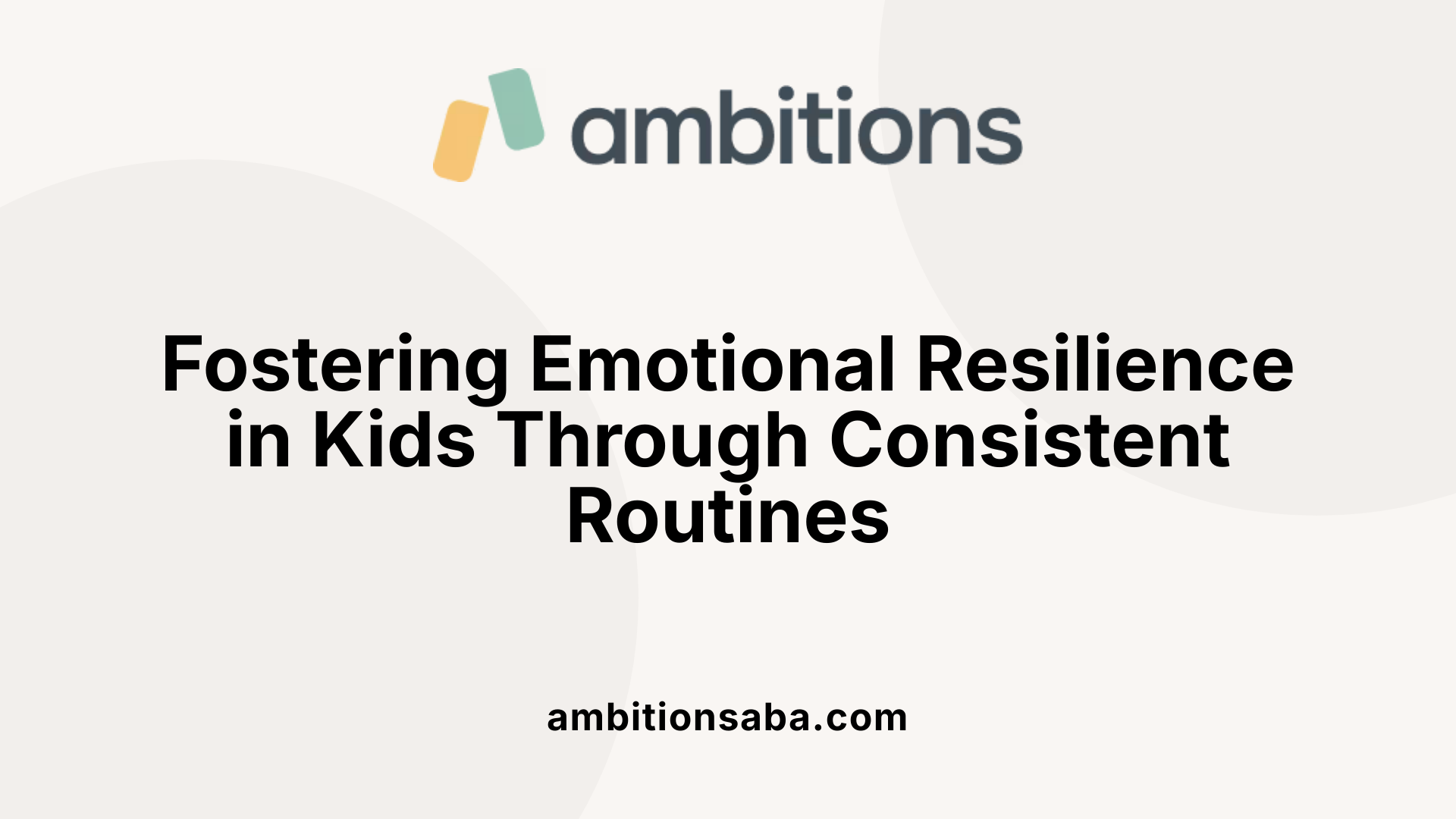Understanding the Role of Routine in Supporting Well-Being
Structured routines serve as foundational tools for promoting mental health, providing predictability, stability, and a sense of control. They help individuals manage stress, reduce decision fatigue, and foster emotional resilience. From establishing consistent sleep schedules to engaging in health-promoting activities, routines support both recovery and ongoing maintenance of mental well-being, especially during challenging times like the COVID-19 pandemic.
The Significance of Routines in Mental Health Recovery

Why is routine important for mental health?
Routine plays a vital role in mental health recovery by establishing a stable framework that individuals can rely on, especially during times of stress or emotional upheaval. Maintaining consistent habits related to sleep, diet, physical activity, and social interactions creates predictable patterns that promote emotional stability and overall well-being.
Regular routines help reduce decision fatigue—the mental exhaustion caused by making countless daily choices—by providing structure and clear expectations. This mental clarity allows individuals to conserve energy and focus on recovery efforts or engaging in therapeutic activities.
In addition, routines foster a sense of control and safety. When daily activities are predictable, individuals feel more secure, which can alleviate symptoms of anxiety and depression. For children and adults alike, such stability supports proper regulation of moods and emotions.
Consistent engagement in self-care practices like mindfulness, exercise, and adequate sleep not only enhances mood but also alleviates physical symptoms associated with mental health conditions. Routines also encourage long-term adherence to healthy behaviors, making it easier to sustain wellness strategies over time.
Furthermore, routines support the development of positive habits that contribute to resilience. For example, scheduling time for social connections can mitigate feelings of loneliness, while regular physical activity can reduce symptoms of anxiety and depression.
In children, establishing routines—like bedtime rituals and daily family activities—helps create a safe environment conducive to emotional stability and academic success. For adults, routines during treatment programs, such as Jackson House's personalized schedules, facilitate focus on healing, reduce overwhelm, and strengthen progress.
Research underscores that a structured daily pattern not only buffers against mental health challenges but also enhances the ability to cope with stressful life events. This stability encourages ongoing recovery and helps prevent setbacks, affirming the importance of incorporating routines into comprehensive mental health treatment plans.
Supportive environment creation in residential care
Residential programs like Jackson House emphasize the importance of routine by providing a stable, distraction-free environment. This setting helps patients focus on treatment, develop new habits, and build routines without external triggers that might hinder progress.
Within these programs, structured schedules include therapy sessions, medication management, and scheduled activities designed to reinforce healthy behaviors. Such routine-based environments support patients' efforts to develop sustainable habits crucial for long-term recovery.
Personalized routines for individual needs
Each person's mental health journey is unique, requiring tailored routines that fit their specific circumstances and goals. Jackson House creates individualized treatment plans that incorporate personal preferences and life circumstances, supporting the development of routines that are realistic, manageable, and effective.
Personalized routines can include setting specific wake-up times, incorporating preferred physical activities, or establishing social engagement practices that resonate with the individual. This customization fosters greater adherence and motivation, ultimately supporting better mental health outcomes.
In conclusion, structured routines—whether in treatment or daily life—are fundamental in supporting mental health. They offer stability, reduce stress, and promote the development of healthy, sustainable habits that empower individuals on their recovery path.
Building Supportive Routines Within Healthcare and Residential Settings

How can support programs incorporate routines to aid mental health?
Support programs play a vital role in helping individuals build routines that foster mental well-being. They emphasize encouraging the development of regular, repeated behaviors that support health, such as consistent sleep schedules, scheduled physical activities, and mindfulness practices like meditation or breathwork.
By establishing these routines, programs improve adherence to lifestyle recommendations, which are crucial for both mental and physical health. For example, setting specific times for meals, exercise, and relaxation creates predictability and a sense of control, reducing anxiety, especially during stressful times such as a pandemic.
Healthcare providers should focus on gradual changes, starting with one or two simple habits at a time. This incremental approach makes routines easier to adopt and sustain, preventing feelings of overwhelm.
In addition to physical activities and sleep, routines involving social connections, like regular calls or family meals, can significantly boost emotional resilience. Safe practices around substance use—avoiding harmful substances and environmental toxins—are also incorporated.
Ultimately, routines centered around key lifestyle elements—nutrition, physical activity, sleep, social support, and stress management—serve as effective tools to prevent mental health issues and support ongoing recovery.
The environment of residential care and its benefits for routines
Residential care settings, such as Jackson House, create a structured environment designed to support routine development. These programs provide a stable, predictable daily schedule that minimizes external triggers, which can often exacerbate mental health symptoms.
In Jackson House, structure includes scheduled therapy sessions, medication management, and personalized activity plans. This consistent routine helps residents focus on recovery and develop healthy habits without the distractions and stresses of outside environments.
The environment itself promotes a sense of safety and predictability, essential for individuals managing conditions like anxiety, depression, or PTSD. The routine established in residential care encourages discipline and continuity that can extend beyond treatment, forming the foundation for long-term mental health management.
Having a structured setting also allows staff to monitor progress more effectively, making adjustments as needed to individual routines, which supports sustained recovery.
Customizing routines for individual recovery
Each person’s recovery journey is unique, and routines must be tailored to individual needs and preferences. Jackson House emphasizes personalized treatment plans that consider each person's strengths, challenges, and goals.
Custom routines may include specific activities such as physical exercise, social tasks, or relaxation techniques that resonate with the individual. For some, a routine might involve morning meditation and scheduled walks, while for others, it might focus on meal planning or art therapy sessions.
Flexibility within routines is essential, allowing individuals to adapt as they progress or face new challenges. Teaching skills like psychological flexibility—being open, aware, and engaged—helps residents make real-time adjustments to routines and maintain engagement.
Support from staff involves guiding individuals in planning sustainable routines and providing encouragement and accountability. Over time, these personalized routines help individuals build resilience, foster independence, and sustain mental health improvements long after leaving residential care.
The Impact of Routines During Challenging Times Like a Pandemic

Why are routines especially important during challenging times like a pandemic?
In times of crisis, such as the COVID-19 pandemic, routines become vital tools for maintaining mental health. They offer a sense of normalcy and stability when external circumstances are unpredictable and stressful. Establishing regular habits helps individuals feel more in control, reducing feelings of fear and uncertainty.
Routines help manage stress by creating predictability in daily life. Simple activities like consistent sleep schedules, regular meals, and physical exercise can significantly improve mood and physical health. They also foster emotional resilience by supporting social connections through virtual calls or outdoor activities safely distanced.
By focusing on health-oriented routines—such as mindfulness, self-care, and healthy eating—people can better cope with anxiety and depression. Incorporating engaging activities that promote wellbeing encourages a positive outlook despite external challenges. Overall, routines are essential for navigating stress effectively, providing structure, purpose, and opportunities for connection during difficult times.
How can routines be maintained or adapted during restrictions and uncertainties?
Even with restrictions like social distancing and lockdowns, routines can be adapted to fit the new context. For example, indoor activities such as home workouts or meditation can consolidate or replace outdoor or social routines. Replacing in-person meetings with virtual calls helps maintain social connections.
Expanding routines to include new habits, such as longer handwashing or regular cleaning, supports health safety and routine stability. Setting specific times for activities like cooking, exercise, and relaxation reinforces structure. Using cues like alarms or visual reminders can help individuals stay on track.
Maintaining flexibility in routines is also crucial. Allowing room for adjustments prevents frustration and supports mental adaptability. Importantly, establishing routines around daily self-care routines—like showering, dressing, and eating at regular times—encourages psychological resilience and stability even amid uncertainties.
What are primary and secondary routines?
Routines can be categorized into primary and secondary groups. Primary routines include essential behaviors necessary for basic needs, such as sleeping, eating, hygiene, and maintaining regular physical activity. These activities form the foundation of daily health and stability.
Secondary routines involve individual preferences and social activities that are not strictly necessary but contribute to overall wellbeing. Examples include hobbies, socializing, leisure activities, or engaging in mindfulness practices.
During crises, emphasizing primary routines becomes particularly important, as disruptions here—like irregular sleep or diet—can negatively impact mental health more significantly. Balancing primary and secondary routines helps sustain emotional resilience, adapt to new realities, and support long-term mental health recovery.
Lifestyle Behaviors That Bolster Mental Well-Being

How do lifestyle habits impact mental well-being?
Our everyday habits play a crucial role in shaping mental health. Engaging in regular physical activity, such as aerobic exercises and resistance training, is proven to reduce symptoms of depression, anxiety, and stress. Conversely, a sedentary lifestyle with excessive screen time can negatively affect mental health.
Nutrition also matters greatly. A diet rich in vegetables, fruits, nuts, and fish—like the Mediterranean diet—supports brain health by promoting gut microbiome diversity, which is linked to mood regulation. In contrast, processed foods may contribute to poorer mental outcomes.
Getting sufficient sleep, maintaining strong social connections, and practicing mindfulness techniques like meditation or yoga are additional factors that boost emotional resilience, reduce stress, and improve overall mental wellness.
A balanced lifestyle encompasses avoiding harmful substances such as tobacco and excessive alcohol, further supporting mental health. Combining these behaviors creates a nurturing environment for mental stability, helping individuals to prevent or manage mental health conditions effectively.
Summary Table of Lifestyle Behaviors and Their Mental Health Benefits:
| Behavior | Impact on Mental Health | How to Incorporate |
|---|---|---|
| Physical activity | Reduces depression, anxiety; enhances mood | Daily walks, sports, resistance exercises |
| Healthy diet | Supports gut health, reduces depressive symptoms | Eat more vegetables, fruits, nuts, fish |
| Sleep | Improves mood, concentration; stabilizes emotions | Maintain regular sleep schedule; pre-bed routines |
| Social connections | Builds resilience, reduces loneliness | Engage with friends, family, community activities |
| Mindfulness practices | Decreases stress, enhances emotional regulation | Meditation, yoga, deep breathing exercises |
Adopting these habits consistently over time fosters an environment conducive to mental well-being, leading to a healthier, more balanced mind.
Supporting Children and Adolescents in Developing Routines for Mental Health

Establishing predictable daily schedules
Creating a consistent daily routine helps children and adolescents feel secure, reducing feelings of stress and anxiety. Regular wake-up, meal, study, play, and sleep times establish a sense of order and predictability. Having a balanced schedule that includes physical activity, rest, and social interaction supports overall mental well-being.
Incorporating specific routines, such as a calming bedtime ritual—bathing, reading a book, and limiting screen time—can improve sleep quality, which is crucial for mental health. Visual schedules or charts can also help young children understand and follow their routines independently.
Family routines and rituals
Shared activities like family meals, game nights, or outdoor walks promote strong emotional bonds, foster a sense of safety, and support mental health. Family rituals create a predictable pattern of positive interactions that reinforce emotional security.
Celebrating small successes within routines, such as completing chores or trying new activities, boosts children’s self-esteem. These routines and rituals help children learn self-regulation skills and develop resilience against stress.
Managing transitions and stress
Transitions—like starting a new school year or moving homes—can disrupt routines and increase anxiety. During these times, maintaining familiar routines as much as possible provides stability.
Parents can support children by preparing them for changes ahead, explaining what to expect, and creating visual plans to ease transitions. Encouraging expression of feelings and using calming activities like deep breathing or mindfulness practices helps children manage stress.
In childcare settings or homes, setting aside time for reflection and open conversations about feelings promotes emotional regulation. Flexibility and patience are essential, as adapting routines gradually ensures children feel supported and secure.
| Aspect | Strategy | Benefits |
|---|---|---|
| Routine establishment | Consistent schedule, visual aids | Reduces anxiety, improves sleep |
| Family involvement | Shared meals, rituals | Strengthens emotional bonds |
| Transition support | Prepare ahead, use calming activities | Eases anxiety, promotes resilience |
Supporting children and teenagers in developing and maintaining healthy routines involves a mindful approach that balances structure with flexibility. Done well, routines become a vital foundation for their mental health and emotional resilience, especially during stressful periods.
Fostering Lasting Mental Health Through Routine
Implementing and maintaining supportive routines is a vital strategy in mental health care, offering stability, reducing stress, and promoting well-being for individuals across all ages. From structured treatment environments like Jackson House to daily habits at home, routines help individuals navigate life’s challenges, recover from setbacks, and sustain mental health. By fostering discipline and flexibility, encouraging positive lifestyle behaviors, and supporting vulnerable populations such as children and adolescents, routines serve as accessible, effective tools to enhance resilience and ensure long-term mental well-being.
References
- Why a Structured Routine Is Key to Mental Health Recovery
- Regularizing daily routines for mental health during and after the ...
- Lifestyle to Support Mental Health - American Psychiatric Association
- The Psychological Benefits of a Structured Routine - Humantold
- The Importance of Creating Habits and Routine - PMC
- How Establishing Daily Habits Can Improve Mental Health
- The Importance of Routine in Mental Health Programs - Mission Prep
- Why Routines are Important for Mental Health



